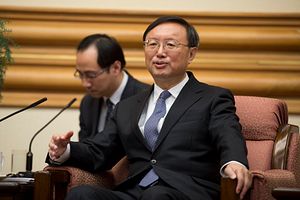China’s top diplomat, State Councilor Yang Jiechi, is in the United States for a two-day visit, the Chinese Foreign Ministry has announced.
“At the invitation of the U.S. government, State Councilor Yang Jiechi will visit the U.S. from February 27 to 28,” spokesperson Geng Shuang told reporters at a regular press conference on Monday. “During the visit, he will exchange views with high-level officials of the U.S. on China-U.S. relations and issues of mutual interest.”
Geng declined to provide details on what would be discussed or which U.S. officials Yang would meet with, only saying, “We will release information about relevant arrangements of State Councilor Yang Jiechi’s visit in due course.” Generally, the primary host of an official visit is identified as the person extending the invitation – this time the “U.S. government” is cited as host.
Yang’s visit adds to a fairly thin list of official contacts between the new Trump administration and the Chinese government. Earlier this month, Trump himself spoke with Chinese President Xi Jinping over the phone. Trump’s State and Treasury secretaries have also held phone conversations with Chinese officials. However, Yang’s visit is the first by a high-ranking Chinese official to the United States since Trump’s inauguration on January 20. There has been one other face-to-face meeting, when Secretary of State Rex Tillerson met with Chinese Foreign Minister Wang Yi at the G20 talks in Bonn. (For comparison, by this time during the Obama administration’s first term, then-Secretary of State Hillary Clinton had already visited China.)
Yang is considered one of the Chinese government’s top experts on the United States, having served as ambassador to the country from 2000-2004. Prior to the presidential transition, Yang met with Trump’s designated pick for national security advisor, Michael Flynn. Flynn, however, was forced to step down soon after taking office due to concerns over his contact with the Russian ambassador.
More recently, on February 21, Yang spoke with Tillerson on the phone. According to a State Department read-out, the two sides discussed North Korea, “economics and trade, and potential cooperation on counterterrorism, law enforcement, and transnational crime.”
Yang’s experience in the United States will come in handy as Beijing tries to sort out exactly where the Trump administration stands on the U.S.-China relationship. Trump made a number of comments that were alarming to Chinese leaders prior to the transition, including questioning the “one China” policy and repeatedly threatening to punish China for trade violations. Since assuming office, however, the Trump administration has kept a low profile on China issues.
On a previous trip to the United States, in February 2015, Yang met primarily with then-National Security Advisor Susan Rice, where the two discussed initial plans for Xi’s visit to the United States in September of that year. That context has helped sparked speculation that Yang’s trip is meant to pave the way for the first Trump-Xi meeting. Xinhua, China’s state news agency, cited a Chinese scholar as saying that a Trump-Xi meeting will be at the top of Yang’s agenda for the visit.
However, Geng, the Foreign Ministry spokesperson, declined to confirm such a conversation would take place, only referencing the Trump-Xi phone call’s commitment to close communication and a meeting “at an early date.”
South China Morning Post, citing unnamed “diplomatic observers,” pegged the upcoming G20 summit, to be held in July in Hamburg, Germany, as a possible site for the two leaders’ first meeting. “But,” the Hong Kong-based daily added, “it is not clear if Trump will attend the Group of 20 summit because his new administration appears skeptical of multinational political gatherings.”
For now, both sides are keeping mum about specifics regarding their contacts and conversations, as the lack of details surrounding Yang’s visit exemplifies. The only details available as of now come from White House press secretary Sean Spicer, who was asked about Yang’s visit in his daily press briefing. Spicer revealed that Yang and a “delegation of six people” had attended a meeting with new National Security Advisor H.R. McMaster and Jared Kushner, Trump’s son-in-law and a senior advisor to the president. After that meeting, Spicer said, Yang was taken “to say hi to the president” before leaving the White House. As for the topic of discussion, Spicer said the conversation focused on “shared interests of national security.” It’s still unclear what activities are on Yang’s agenda for tomorrow.
That vagueness is no surprise, as details have been sparse surrounding other U.S.-China interactions, from Trump’s phone call with Xi to Tillerson’s meeting with Wang. That may well be a reaction to the close readings media outlets all over the world give to U.S.-China relations. Both the Trump administration and Chinese government may have decided that the less information they release the better after witnessing the furious coverage that followed (for example) Trump’s comments on the “one China” policy last year.
It’s also worth pointing out that both the Trump administration and the Chinese government have combative relationships with the media in general. Given that, the lack of public information surrounding Yang’s visit may well be a “new normal” for official interactions.

































